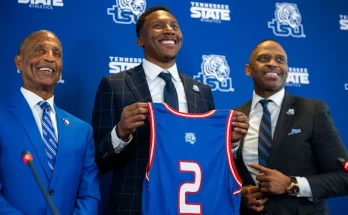The University of Texas, a school where football reigns supreme, has made a bold statement in its basketball ambitions by investing heavily in Sean Miller. The move signals a clear shift in priorities, as the Longhorns aim to establish themselves as a national powerhouse on the hardwood, despite their historical identity being rooted in the gridiron. The question remains: can Miller deliver a Final Four appearance to justify the school’s aggressive approach?
Texas has long been a football-first institution. The Longhorns’ storied history, massive fan base, and financial juggernaut status in collegiate athletics have made them one of the premier programs in the country. Yet, basketball has often been treated as an afterthought, despite occasional flashes of success. Rick Barnes had a strong tenure in Austin, regularly making the NCAA Tournament and reaching the Final Four in 2003. Shaka Smart, with his “Havoc” style, was expected to bring sustained success but never quite lived up to the lofty expectations. Chris Beard’s tenure was brief and tumultuous, and Rodney Terry’s stint, despite an Elite Eight run, failed to cement confidence in the program’s long-term viability on the national stage. Now, Texas turns to Miller in the hopes that he can elevate the program to consistent Final Four contention.
Miller arrives with a mixed reputation. He is widely regarded as one of the most tactically sound coaches in college basketball, with an impressive track record of success at Xavier and Arizona. His ability to recruit elite talent and develop players into NBA prospects makes him an attractive hire. However, his past is not without controversy, as NCAA investigations into recruiting violations at Arizona cast a shadow over his otherwise strong coaching credentials. Texas, however, appears willing to overlook past concerns, betting that his coaching acumen will outweigh any baggage he brings.
The decision to invest in Miller underscores Texas’s growing commitment to basketball. The Longhorns boast one of the nation’s premier athletic budgets, a state-of-the-art arena in the Moody Center, and access to elite talent within Texas and beyond. By securing Miller, they are signaling to recruits, donors, and fans that they are serious about competing at the highest level in college basketball.
The challenge for Miller will be navigating the landscape of Texas athletics, where football will always be king. The culture of Longhorns sports revolves around the success of the football team, meaning that basketball—no matter how much investment it receives—will still play second fiddle in terms of fan engagement, media coverage, and overall institutional focus. In some ways, this provides Miller with a unique opportunity; expectations for Texas basketball, while growing, are not nearly as suffocating as those for football. If he succeeds, he will be lauded as a transformative figure for the program. If he falls short, he will simply join the long list of coaches who failed to make Texas basketball a perennial contender.
Recruiting will be crucial to Miller’s success in Austin. Texas has long been a fertile recruiting ground, producing some of the best basketball talent in the country. However, the state’s top prospects have historically been lured away by blue-blood programs such as Kentucky, Duke, and Kansas. Even when Texas has secured elite talent—Kevin Durant, Myles Turner, and Jarrett Allen, to name a few—it has struggled to translate those recruiting wins into deep NCAA Tournament runs. Miller’s track record suggests he can change that narrative. His ability to attract and develop top-tier players will be instrumental in turning Texas into a legitimate championship contender.
Another key factor will be his ability to compete in the ever-changing landscape of college basketball, particularly in the era of the transfer portal and NIL (Name, Image, and Likeness) deals. Texas, with its vast financial resources, has the potential to be a major player in the NIL space, offering recruits lucrative opportunities that few programs can match. However, navigating these waters requires more than just financial muscle; it requires a strategic vision for roster building, player retention, and program culture. Miller will need to quickly establish a blueprint for leveraging NIL deals while maintaining the cohesion necessary for sustained success.
On the court, Miller’s coaching philosophy should fit well with Texas’s aspirations. Known for his disciplined defensive approach and structured offensive sets, he brings a level of tactical sophistication that has been lacking in previous Texas teams. His teams at Arizona and Xavier were known for their toughness, efficiency, and ability to compete with the best programs in the country. If he can instill that same mentality in Texas’s roster, the Longhorns could quickly become a force in the Big 12 and beyond.
The Big 12, widely regarded as one of the toughest conferences in college basketball, will provide an immediate test for Miller. Kansas has long been the dominant force in the league, with Baylor and Houston emerging as national powerhouses in recent years. Texas, despite its resources, has often struggled to maintain consistency in a conference loaded with elite competition. Miller will be expected to not only compete but to elevate Texas into the upper echelon of the league. That means consistently finishing near the top of the standings, making deep Big 12 Tournament runs, and positioning the Longhorns for favorable seeding in the NCAA Tournament.
Ultimately, Miller’s success at Texas will be measured by his ability to lead the program to the Final Four. While making the NCAA Tournament and advancing past the first weekend would represent progress, Texas did not hire Miller simply to be competitive; they hired him to win at the highest level. A Final Four appearance would validate the school’s decision to invest in basketball and prove that Texas can be a legitimate contender in a sport where it has historically played a secondary role.
The road to the Final Four will not be easy. Building a championship-caliber team requires not only talent but also chemistry, experience, and a bit of luck. Injuries, tough matchups, and the unpredictability of March Madness can derail even the most talented squads. However, Miller has been in this position before. He has led multiple teams to deep tournament runs, coming agonizingly close to breaking through to the Final Four on several occasions. If he can bring that same level of competitiveness to Texas, it is only a matter of time before the Longhorns find themselves playing on college basketball’s biggest stage.
Texas’s investment in Miller represents a shift in priorities, a recognition that basketball deserves the same level of commitment and resources as football. Whether or not that investment pays off will depend on Miller’s ability to recruit, coach, and navigate the unique challenges of leading a basketball program at a football school. If he succeeds, he will not only elevate Texas basketball but also change the perception of what the Longhorns can achieve on the national stage. If he falls short, Texas will once again find itself searching for the coach who can finally take them to the promised land.
For now, optimism abounds in Austin. The hiring of Miller has injected excitement into the program, raising expectations and fueling hopes of a Final Four run. The pieces are in place: a state-of-the-art arena, a fertile recruiting base, and a coach with a proven track record. Now, it is up to Miller to deliver. Texas has made its bet, and only time will tell if it pays off.



